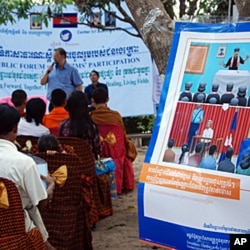In 1998 the town of Anlong Veng in Cambodia's northwest became the last stronghold of the Khmer Rouge to surrender to the government. Recently, the community was the scene of a new effort to help bring reconciliation and justice to the region.
On the outskirts of Anlong Veng sits the compound of the movement's last leader, Ta Mok, who died in jail awaiting trial four years ago. Ta Mok was a terrifying figure in Cambodia, but he was much admired here.
Recently, his home saw the first reconciliation meeting of former Khmer Rouge cadres and the group's victims.
Cambodian-American lawyer Daravuth Seng runs the Center for Justice and Reconciliation, which organized the meeting. He says the gathering aims to get Khmer Rouge members and their victims to talk to each other to promote understanding.
From that understanding, he says, reconciliation can come.
"When we are talking about reconciliation, it is reconciliation of a nation, and with the Cambodian context that must include a lot of the former perpetrators as well. And in one sense we're all victims in this process," Seng said.
From 1975 to 1979, the ultra-Maoist Khmer Rouge, led by Pol Pot, were responsible for the deaths of more than a million Cambodians - from disease, overwork or execution.
Around 150 former Khmer Rouge and some of their families gathered here as well as a small group of Buddhist monks. Several police attended, along with representatives from the international tribunal that is trying five Khmer Rouge leaders.
It is not long before the Khmer Rouge raise their main concern. They have heard the tribunal has a secret list of five more it wants to prosecute.
They say that violates a pledge they received when they surrendered in 1998 that there would be no losers from their defections.
An elderly woman addresses the tribunal staff.
Her name is Im Chaem, and she was a Khmer Rouge district chief in the late 1970s. Media reports have speculated she could be one of the five names on the list for prosecution.
Im Chaem wants the prosecutions to end with the five people already in custody, saying at one time the tribunal indicated only five were suspected but now it refers to another five. This made all the elderly people who were engaged in the war feel unsafe. She says they do not know when it will be their turn because they lived and served during that time. Even though Pol Pot died already, there might be another five and then five more and then 10?
Tribunal spokesman Lars Olsen says today is unusual since most Cambodians want to know why so few Khmer Rouge are being held accountable.
"Here it is 'Why do you want to prosecute more? It should be enough with the five, don't stir up everything after we have reintegrated.' So this is the major difference," Olsen said.
The trial of one Khmer Rouge leader ended last year and a verdict is expected in the coming months. Four others are in prison and are expected to face trial next year. Most of the group's senior leaders, however, died long before the tribunal began its work a few years ago.
By the end of the day, participants have discussed the meaning of reconciliation, justice and reintegration. There is broad agreement that the leaders currently in jail ought to be prosecuted, but no one else.
Participants are also tired of being referred to as "former Khmer Rouge." They say the term is equated with murder and oppression, which is unfair to their children. Far better, they say, that all are called Cambodian.
And they recognize their lives have improved since they defected. One attendee says families used to live in the mountains and were unable to share a meal together. Now their children have schooling, and people have access to health services and good roads.
In short, they want peace and more economic development for this impoverished part of Cambodia. It is time, they say, to look to the future.
Organizer Daravuth Seng says the day went better than he expected. Former Khmer Rouge turned up, engaged, and spoke.
They listened as a member of a victims' association told them that the Khmer Rouge - responsible for the deaths of perhaps 2 million Cambodians - killed his parents.
Seng says one or two people even showed remorse. A central purpose of the reconciliation effort is to grasp why they joined the Khmer Rouge.
"If we are to say never again, we really need to understand both sides, to understand the way these folks are perceiving the world," Seng said.
He says the day's event is not an end in itself, but the beginning of steps toward reconciliation.





